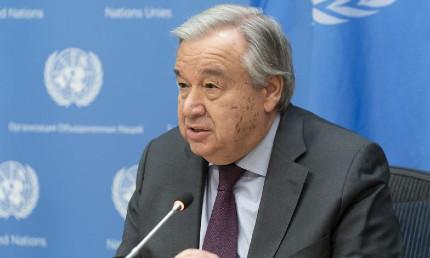THE SECRETARY-GENERAL
—
VIDEO REMARKS AT THE UN GLOBAL COMPACT LEADERS SUMMIT
Virtual, 15 June 2020
Excellencies, Ladies and gentlemen, Business leaders, Friends,
It is a pleasure to greet you as we mark 20 years of the United Nations Global Compact uniting business for a better world.
By bringing together thousands of private sector leaders as the world faces the COVID-19 pandemic, this Summit is an opportunity to reflect on how business can support countries and communities around the world to recover better, recover stronger and recover together from the crisis.
We are facing a health crisis, as well as an economic and social crisis, with no parallel in the history of the United Nations. Moreover, we continue to face a global climate emergency with colossal risks for people and the natural systems that sustain us.
I am encouraged to see so many companies, of so many sizes and from so many sectors and countries, recognizing the urgent need for global unity and international cooperation.
Two decades ago, my predecessor as Secretary-General, Kofi Annan, called on business leaders to initiate a “Global Compact” of shared values and principles to give a human face to the global market. It was his view that, and I quote, “if we cannot make globalization work for all, in the end it will work for none.”
Today, the fabric of society and the wellbeing of people hinge on our ability to build a fair globalization.
The Global Compact has sought to move us in precisely that direction.
What started as a niche group of 44 business leaders has now blossomed into a global movement, encompassing more than 10,000 companies, 3,000 non-business stakeholders and 68 Local Networks.
All of these participants are championing the idea that business has a key role to play in creating a world and a global economy where people and planet alike can thrive.
The initiative is guided by ten universal principles calling for the protection of human rights, labour rights, environmental responsibility and anti-corruption.
And our shared aim is to see businesses integrating these principles into their core strategy and operations, taking strong steps to support the Sustainable Development Goals, and reporting publicly on progress.
I commend the significant achievements we have made across the years.
The Compact has made immense strides in mainstreaming responsible business leadership practices around the world.
It has spurred ambition on climate change through the 1.5 degrees campaign.
It has advanced gender equality through the Women’s Empowerment Principles, and promoted sustainable, ethical approaches through the Principles for Responsible Investment.
The Compact has also focused on nurturing the business leaders of tomorrow through the Principles for Responsible Management Education.
Where once “do no harm” was a common approach for the business community, today we are arriving at a new landscape of elevated expectations and responsibilities.
But despite progress, serious threats could undermine our future, including climate change, poverty, loss of biodiversity and widening social inequalities.
And the pandemic has underscored the world’s fragilities, which extend far beyond the realm of global health.
Now more than ever, as big decisions are made about our future, companies need to address environmental, social and governance risks holistically and move beyond business-as-usual.
To advance this work, we have announced a set of best practice business benchmarks across all 17 Sustainable Development Goals as part of the SDG Ambition initiative.
I challenge all of you to take more ambitious and comprehensive action across your operations and value chains by setting goals in line with these benchmarks.
It is especially important for you to support efforts to achieve emissions reductions of 45 per cent from 2010 levels this decade, and to reach net-zero emissions by mid-century.
The world also needs a business community fully committed to transparency and accountability. We are pressing for companies to report more fully, including in line with the Task Force on Climate-related Financial Disclosures. Such steps are crucial for assessing risks.
That is also why we are updating the Compact’s annual “Communication on Progress” framework. This will help to establish an open, global repository of corporate sustainability data — and thereby enable better assessment of companies’ sustainability performance and, we hope, inspire them to raise their ambitions.
Ladies and Gentlemen,
I want to take this opportunity to thank Lise Kingo for her leadership in steering the work of the UN Global Compact for the past five years. Her contributions have undoubtedly strengthened the UN system’s engagement with business.
I look forward to welcoming Sanda Ojiambo into her new role as the next Executive Director of the initiative. I am confident that Sanda brings the vision and expertise needed to build on our successes and take the initiative to even greater heights.
From its inception, the United Nations Global Compact has advanced the vision that when businesses unite, they can be a powerful force for good.
In an unprecedented time of global uncertainty and crisis, this vision has never been more important.
Together, we can take corporate sustainability from the fringes to the mainstream, and unite in the business of a better world.
Thank you.

